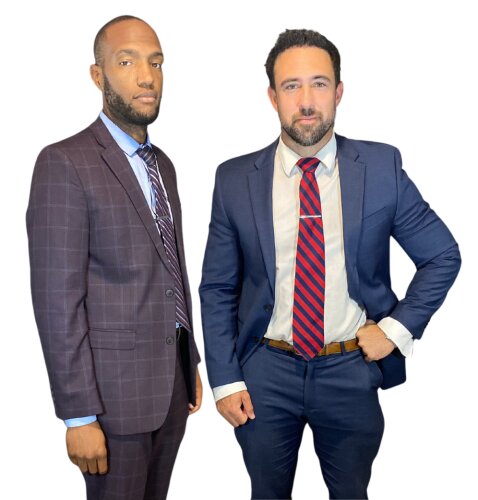Best Asylum Lawyers in Florida
Share your needs with us, get contacted by law firms.
Free. Takes 2 min.
Or refine your search by selecting a city:
List of the best lawyers in Florida, United States
About Asylum Law in Florida, United States
Asylum law in Florida, United States provides protection to individuals who have fled their home countries due to persecution based on race, religion, nationality, membership in a particular social group, or political opinion. Asylum is governed primarily by United States federal law, but Florida's geographic location means it has a large number of asylum seekers, especially from Latin America and the Caribbean. Asylum allows individuals to remain in the U.S., avoid deportation, and eventually apply for permanent residency if their cases are successful. Applying for asylum in Florida follows the same general federal process, but local immigration offices and courts play a significant role in handling these cases.
Why You May Need a Lawyer
Seeking asylum is a complex legal process, and many applicants face challenges that are difficult to overcome without legal assistance. Common situations where legal help is crucial include:
- Navigating complicated application forms and submission deadlines
- Gathering credible evidence and preparing compelling statements or affidavits
- Preparing for interviews with U.S. Citizenship and Immigration Services (USCIS) officers or appearing in immigration court
- Responding to requests for additional evidence or explaining inconsistencies
- Handling language barriers and understanding legal terminology
- Appealing a denial or deportation order
A lawyer who understands asylum law and the local practices in Florida can dramatically increase your chances of a successful outcome by providing guidance, advocacy, and peace of mind.
Local Laws Overview
Asylum in Florida is primarily regulated by federal law, but specific local practices and resources can affect your case.
- Asylum applications are processed initially through the USCIS Asylum Office located in Miami. If your case is referred to court, it will be heard in immigration courts in Miami, Orlando, or other locations depending on your residence.
- Florida has a high volume of asylum cases, which can lead to delays. It is important to apply as soon as possible and ensure your documents are accurate and complete.
- If you are in removal proceedings, your case will be handled by an immigration judge. Each local court may have its own scheduling procedures and administrative preferences.
- Florida non-profit organizations offer limited-scope legal assistance, but demand often exceeds supply.
- Local police may have varying cooperation levels with federal immigration authorities. However, local police do not have the authority to grant or deny asylum.
Being aware of local timelines, hearing locations, and available legal aid programs can make a significant difference throughout the asylum process in Florida.
Frequently Asked Questions
What is asylum and how is it different from refugee status?
Asylum is protection granted to people already in the U.S. or at a U.S. port of entry who are unable or unwilling to return to their home countries due to persecution. Refugee status is similar but is applied for outside the United States.
How do I apply for asylum in Florida?
You must file Form I-589, Application for Asylum and for Withholding of Removal, within one year of your arrival in the U.S. The process may involve interviews with USCIS or hearings before an immigration judge.
Do I need to be in the U.S. to apply for asylum?
Yes, you need to be physically present in the United States or be at a U.S. port of entry to apply for asylum.
What documents do I need for my asylum application?
Required documents include Form I-589, a written statement about your experiences, identity documents such as a passport, and any evidence supporting your claim (medical records, police reports, news articles, etc.).
Can I apply for asylum if I entered the U.S. illegally?
Yes, the law allows you to apply for asylum regardless of how you entered the country, as long as you apply within one year of entry unless you meet exceptions for late filing.
What happens after I file my asylum application?
You may be scheduled for a biometrics appointment, an interview at the Miami Asylum Office, or a hearing before an immigration judge if you are already in removal proceedings. The process can take months or even years.
What if my asylum application is denied?
If your application is denied by USCIS and you are not in lawful status, you will be referred to immigration court for removal proceedings, where you can seek another review of your asylum claim. If an immigration judge denies your case, you may appeal to the Board of Immigration Appeals.
Can I work while my asylum application is pending?
You can apply for an Employment Authorization Document (EAD) 150 days after your asylum application is filed. You may not work legally before you receive your EAD.
Can I include my family on my asylum application?
Yes, you can include your spouse and children who are in the United States and under 21 years old and not married.
Is there a fee to apply for asylum?
There is no government filing fee for Form I-589, Application for Asylum and for Withholding of Removal.
Additional Resources
If you are seeking legal advice or assistance with an asylum case in Florida, the following resources may be helpful:
- United States Citizenship and Immigration Services (USCIS) Asylum Office - Miami
- Executive Office for Immigration Review (EOIR) - Immigration Courts in Miami and Orlando
- American Immigration Lawyers Association (AILA) - South Florida Chapter
- Florida Immigrant Coalition
- Catholic Legal Services Archdiocese of Miami
- Americans for Immigrant Justice
- Legal Aid Service of Broward County
- Local law schools with immigration clinics, such as the University of Miami and Florida International University
Next Steps
If you believe you may be eligible for asylum or have already started the process, consider taking these steps:
- Collect all relevant documents, including travel documents, evidence of persecution, and any previous immigration filings
- Write a detailed account of your experiences that led you to seek asylum
- Consult with an experienced immigration lawyer or a reputable legal aid organization in Florida
- Attend all scheduled appointments and hearings
- Meet all deadlines and carefully follow instructions from immigration authorities
- Seek emotional and community support, as the asylum process can be lengthy and stressful
Consulting a knowledgeable immigration attorney can make a substantial difference in your case. They can assess your eligibility, help gather necessary evidence, represent you in interviews or court, and ensure your rights are protected throughout the process.
Lawzana helps you find the best lawyers and law firms in Florida through a curated and pre-screened list of qualified legal professionals. Our platform offers rankings and detailed profiles of attorneys and law firms, allowing you to compare based on practice areas, including Asylum, experience, and client feedback.
Each profile includes a description of the firm's areas of practice, client reviews, team members and partners, year of establishment, spoken languages, office locations, contact information, social media presence, and any published articles or resources. Most firms on our platform speak English and are experienced in both local and international legal matters.
Get a quote from top-rated law firms in Florida, United States — quickly, securely, and without unnecessary hassle.
Disclaimer:
The information provided on this page is for general informational purposes only and does not constitute legal advice. While we strive to ensure the accuracy and relevance of the content, legal information may change over time, and interpretations of the law can vary. You should always consult with a qualified legal professional for advice specific to your situation.
We disclaim all liability for actions taken or not taken based on the content of this page. If you believe any information is incorrect or outdated, please contact us, and we will review and update it where appropriate.
Browse asylum law firms by city in Florida
Refine your search by selecting a city.
















